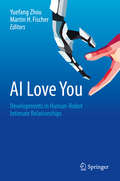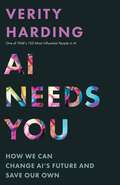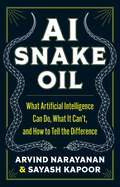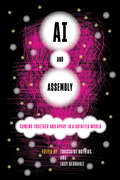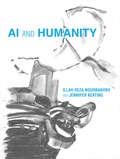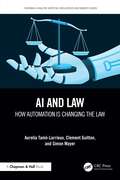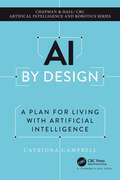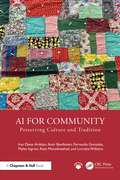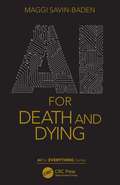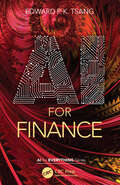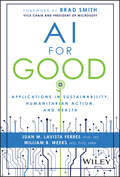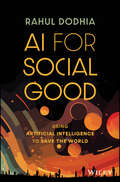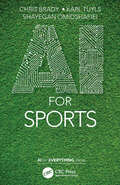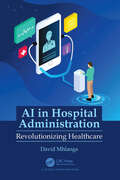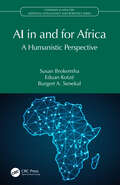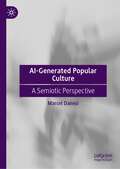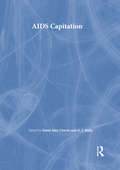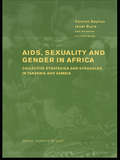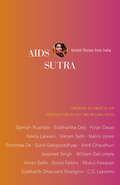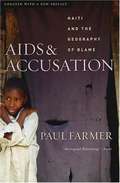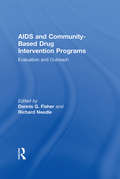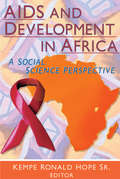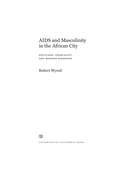- Table View
- List View
AI Love You: Developments in Human-Robot Intimate Relationships
by Martin H. Fischer Yuefang ZhouUsing an interdisciplinary approach, this book explores the emerging topics and rapid technological developments of robotics and artificial intelligence through the lens of the evolving role of sex robots, and how they should best be designed to serve human needs. An international panel of authors provides the most up-to-date, evidence-based empirical research on the potential sexual applications of artificial intelligence. Early chapters discuss the objections to sexual activity with robots while also providing a counterargument to each objection. Subsequent chapters present the implications of robot sex as well as the security and data privacy issues associated with sexual interactions with artificial intelligence. The book concludes with a chapter highlighting the importance of a scientific, multidisciplinary approach to the study of human - robot sexuality. Topics featured in this book include: The Sexual Interaction Illusion Model. The personal companion system, Harmony, designed by Realbotix™. An exposition of the challenges of personal data control and protection when dealing with artificial intelligence. The current and future technological possibilities of projecting three-dimensional holograms. Expert discussion notes from an international workshop on the topic. AI Love You will be of interest to academic researchers in psychology, robotics, ethics, medical science, sociology, gender studies as well as clinicians, policy makers, and the business sector.
AI Needs You: How We Can Change AI's Future and Save Our Own
by Verity HardingA humanist manifesto for the age of AIArtificial intelligence may be the most transformative technology of our time. As AI&’s power grows, so does the need to figure out what—and who—this technology is really for. AI Needs You argues that it is critical for society to take the lead in answering this urgent question and ensuring that AI fulfills its promise.Verity Harding draws inspiring lessons from the histories of three twentieth-century tech revolutions—the space race, in vitro fertilization, and the internet—to empower each of us to join the conversation about AI and its possible futures. Sharing her perspective as a leading insider in technology and politics, she rejects the dominant narrative, which often likens AI&’s advent to that of the atomic bomb. History points the way to an achievable future in which democratically determined values guide AI to be peaceful in its intent; to embrace limitations; to serve purpose, not profit; and to be firmly rooted in societal trust.AI Needs You gives us hope that we, the people, can imbue AI with a deep intentionality that reflects our best values, ideals, and interests, and that serves the public good. AI will permeate our lives in unforeseeable ways, but it is clear that the shape of AI&’s future—and of our own—cannot be left only to those building it. It is up to us to guide this technology away from our worst fears and toward a future that we can trust and believe in.
AI Needs You: How We Can Change AI's Future and Save Our Own
by Verity HardingA humanist manifesto for the age of AIArtificial intelligence may be the most transformative technology of our time. As AI&’s power grows, so does the need to figure out what—and who—this technology is really for. AI Needs You argues that it is critical for society to take the lead in answering this urgent question and ensuring that AI fulfills its promise.Verity Harding draws inspiring lessons from the histories of three twentieth-century tech revolutions—the space race, in vitro fertilization, and the internet—to empower each of us to join the conversation about AI and its possible futures. Sharing her perspective as a leading insider in technology and politics, she rejects the dominant narrative, which often likens AI&’s advent to that of the atomic bomb. History points the way to an achievable future in which democratically determined values guide AI to be peaceful in its intent; to embrace limitations; to serve purpose, not profit; and to be firmly rooted in societal trust.Now with a new foreword by the author, AI Needs You gives us hope that we, the people, can imbue AI with a deep intentionality that reflects our best values, ideals, and interests, and that serves the public good. AI will permeate our lives in unforeseeable ways, but it is clear that the shape of AI&’s future—and of our own—cannot be left only to those building it. It is up to us to guide this technology away from our worst fears and toward a future that we can trust and believe in.
AI Snake Oil: What Artificial Intelligence Can Do, What It Can’t, and How to Tell the Difference
by Arvind Narayanan Sayash KapoorFrom two of TIME&’s 100 Most Influential People in AI, what you need to know about AI—and how to defend yourself against bogus AI claims and productsConfused about AI and worried about what it means for your future and the future of the world? You&’re not alone. AI is everywhere—and few things are surrounded by so much hype, misinformation, and misunderstanding. In AI Snake Oil, computer scientists Arvind Narayanan and Sayash Kapoor cut through the confusion to give you an essential understanding of how AI works and why it often doesn&’t, where it might be useful or harmful, and when you should suspect that companies are using AI hype to sell AI snake oil—products that don&’t work, and probably never will.While acknowledging the potential of some AI, such as ChatGPT, AI Snake Oil uncovers rampant misleading claims about the capabilities of AI and describes the serious harms AI is already causing in how it&’s being built, marketed, and used in areas such as education, medicine, hiring, banking, insurance, and criminal justice. The book explains the crucial differences between types of AI, why organizations are falling for AI snake oil, why AI can&’t fix social media, why AI isn&’t an existential risk, and why we should be far more worried about what people will do with AI than about anything AI will do on its own. The book also warns of the dangers of a world where AI continues to be controlled by largely unaccountable big tech companies.By revealing AI&’s limits and real risks, AI Snake Oil will help you make better decisions about whether and how to use AI at work and home.
AI and Assembly: Coming Together and Apart in a Datafied World
by Toussaint Nothias and Lucy BernholzArtificial intelligence has moved from the lab into everyday life and is now seemingly everywhere. As AI creeps into every aspect of our lives, the data grab required to power AI also expands. People worldwide are tracked, analyzed, and influenced, whether on or off their screens, inside their homes or outside in public, still or in transit, alone or together. What does this mean for our ability to assemble with others for collective action, including protesting, holding community meetings and organizing rallies ? In this context, where and how does assembly take place, and who participates by choice and who by coercion? AI and Assembly explores these questions and offers global perspectives on the present and future of assembly in a world taken over by AI. The contributors analyze how AI threatens free assembly by clustering people without consent, amplifying social biases, and empowering authoritarian surveillance. But they also explore new forms of associational life that emerge in response to these harms, from communities in the US conducting algorithmic audits to human rights activists in East Africa calling for biometric data protection and rideshare drivers in London advocating for fair pay. Ultimately, AI and Assembly is a rallying cry for those committed to a digital future beyond the narrow horizon of corporate extraction and state surveillance.
AI and Humanity (The\mit Press Ser.)
by Illah Reza Nourbakhsh Jennifer KeatingAn examination of the implications for society of rapidly advancing artificial intelligence systems, combining a humanities perspective with technical analysis; includes exercises and discussion questions.AI and Humanity provides an analytical framing and a common language for understanding the effects of technological advances in artificial intelligence on society. Coauthored by a computer scientist and a scholar of literature and cultural studies, it is unique in combining a humanities perspective with technical analysis, using the tools of literary explication to examine the societal impact of AI systems. It explores the historical development of these technologies, moving from the apparently benign Roomba to the considerably more sinister semi-autonomous weapon system Harpy. The book is driven by an exploration of the cultural and etymological roots of a series of keywords relevant to both AI and society. Works examined range from Narrative of the Life of Frederick Douglass, given a close reading for its themes of literacy and agency, to Simon Head's critique of the effects of surveillance and automation on the Amazon labor force in Mindless.Originally developed as a textbook for an interdisciplinary humanities-science course at Carnegie Mellon, AI & Humanity offers discussion questions, exercises (including journal writing and concept mapping), and reading lists. A companion website provides updated resources and a portal to a video archive of interviews with AI scientists, sociologists, literary theorists, and others.
AI and Law: How Automation is Changing the Law (Chapman & Hall/CRC Artificial Intelligence and Robotics Series)
by Aurelia Tamo-Larrieux Clement Guitton Simon MayerThis book provides insights into how AI is changing legal practice, government processes, and individuals’ access to those processes, encouraging each of us to consider how technological advances are changing the legal system. Particularly, and distinct from current debates on how to regulate AI, this books focuses on how the progressive merger between computational methods and legal rules changes the very structure and application of the law itself.We investigate how automation is changing the legal analysis, legal rulemaking, legal rule extraction, and application of legal rules and how this impacts individuals, policymakers, civil servants, and society at large. We show through many examples that a debate on how automation is changing the law is needed, which must revolve around the democratic legitimacy of the automation of legal processes, and be informed by the technical feasibility and tradeoffs of specific endeavors.
AI by Design: A Plan for Living with Artificial Intelligence (Chapman & Hall/CRC Artificial Intelligence and Robotics Series)
by Catriona CampbellThis book introduces the reader to Artificial Intelligence and its importance to our future. Campbell uses behavioural psychology, explores technology, economics, real-life and historical examples to predict five future scenarios with AI. Illustrating through speculative fiction, she describes possible futures after AI exceeds human capabilities. We are at a tipping point in history and must plan to ensure a successful co-existence with artificial intelligence. This book explains how to design for a future with AI so that, rather than herald our downfall, it helps us achieve a new renaissance.
AI for Community: Preserving Culture and Tradition
by Fernando Gonzalez Iran Davar Ardalan Amir Banifatemi Myles Ingram Reza Moradinezhad Lucretia WilliamsAI for Community explores the transformative potential of technology to bridge cultural divides and responsibly preserve cultural heritage, while thoughtfully considering how to ensure fairness without any ideological or cultural bias. It acknowledges the need for careful scrutiny of traditions so that artificial intelligence (AI) systems can promote comprehensive cultural understanding. This approach underscores the promise of AI as a tool for human flourishing.Authored by a multigenerational, multicultural team, this book presents real‑world examples and ethical insights that are timely, actionable, and deeply human‑centered. It introduces pioneering projects like the Indigenous Knowledge Graph, which documented ancestral wisdom; Howard University’s Project Elevate Black Voices, funded by Google, which enhanced speech recognition for African American Vernacular English (AAVE); and Laleh AI, which posthumously preserves the insights of a progressive female Islamic thinker. Also, initiatives like UNESCO’s work on cultural heritage preservation and NVIDIA’s collaboration with Te Hiku Media to safeguard the Māori language showcase AI’s vital role in reviving endangered languages.This book interweaves "Community Voices" sections between chapters, featuring interviews that explore the role and implementation of AI in new arenas. Each chapter is also supported by online resources, accessible as podcasts, videos, and articles, that provide multimedia ways to deepen understanding of culturally aware AI.AI for Community highlights how community‑driven language preservation, storytelling, and inclusive design can empower cultures and protect their heritage. This book is a vital resource for those seeking to create AI that respects and uplifts communities.
AI for Death and Dying (AI for Everything)
by Maggi Savin-BadenWhat is artificial intelligence (AI)? How does AI affect death matters and the digital beyond? How are death and dying handled in our digital age? AI for Dying and Death covers a broad range of literature, research and challenges around this topic. It explores ethical memorisation, digital legacies and bereavement, post death avatars and AI and the digital beyond. It also analyzes religious perspectives on AI for death and dying, and planning for death in a digital age. Maggi Savin-Baden is a Professor of Education at the University of Worcester and has researched and evaluated staff and student experiences of learning for over 20 years and gained funding in this area (Leverhulme Trust, JISC, Higher Education Academy, MoD). She has a strong publication record of over 50 research publications and 17 books which reflect her research interests on the impact of innovative learning, digital fluency, cyber-influence, pedagogical agents, qualitative research methods and problem-based learning. In her spare time, she runs, bakes, climbs and attempts triathalons.
AI for Finance (AI for Everything)
by Edward P. TsangFinance students and practitioners may ask: can machines learn everything? Could AI help me? Computing students or practitioners may ask: which of my skills could contribute to finance? Where in finance should I pay attention? This book aims to answer these questions. No prior knowledge is expected in AI or finance. To finance students and practitioners, this book will explain the promise of AI, as well as its limitations. It will cover knowledge representation, modelling, simulation and machine learning, explaining the principles of how they work. To computing students and practitioners, this book will introduce the financial applications in which AI has made an impact. This includes algorithmic trading, forecasting, risk analysis portfolio optimization and other less well-known areas in finance. This book trades depth for readability. It aims to help readers to decide whether to invest more time into the subject. This book contains original research. For example, it explains the impact of ignoring computation in classical economics. It explains the relationship between computing and finance and points out potential misunderstandings between economists and computer scientists. The book also introduces Directional Change and explains how this can be used.
AI for Good: Applications in Sustainability, Humanitarian Action, and Health
by Juan M. Lavista Ferres William B. WeeksDiscover how AI leaders and researchers are using AI to transform the world for the better In AI for Good: Applications in Sustainability, Humanitarian Action, and Health, a team of veteran Microsoft AI researchers delivers an insightful and fascinating discussion of how one of the world’s most recognizable software companies is tacking intractable social problems with the power of artificial intelligence (AI). In the book, you’ll learn about how climate change, illness and disease, and challenges to fundamental human rights are all being fought using replicable methods and reusable AI code. The authors also provide: Easy-to-follow, non-technical explanations of what AI is and how it works Examinations of how healthcare is being improved, climate change is being addressed, and humanitarian aid is being facilitated around the world with AI Discussions of the future of AI in the realm of social benefit organizations and efforts An essential guide to impactful social change with artificial intelligence, AI for Good is a must-read resource for technical and non-technical professionals interested in AI’s social potential, as well as policymakers, regulators, NGO professionals, and, and non-profit volunteers.
AI for Social Good: Using Artificial Intelligence to Save the World
by Rahul DodhiaUnderstand the real power of AI and and its ability to shape the future for the better. AI For Social Good: Using Artificial Intelligence to Save the World bridges the gap between the current state of reality and the incredible potential of AI to change the world. From humanitarian and environmental concerns to advances in art and science, every area of life stands poised to make a quantum leap into the future. The problem? Too few of us really understand how AI works and how to integrate it into our policies and projects. In this book, Rahul Dodhia, Deputy Director of Microsoft’s AI for Good Research Lab, offers a nontechnical exploration of artificial intelligence tools—how they’re built, what they can and can’t do, and the raw material that teaches them what they “know.” Readers will also find an inventory of common challenges they might face when integrating AI into their work. You'll also read more on: The potential for AI to solve longstanding issues and improve lives Learn how you can tap into the power of AI, regardless of the size of your organization Gain an understanding of how AI works and how to communicate with AI scientists to create new solutions Understand the real risks of implementing AI and how to avoid potential pitfalls Real-life examples and stories that demonstrate how teams of AI specialists, project managers, and subject matter experts can achieve remarkable products. Written for anyone who is curious about AI, and especially useful for policymakers, project managers, and leaders who work alongside AI, AI For Social Good provides discussions of how AI scientists create artificially intelligent systems, and how AI can be used ethically (or unethically) to transform society. You’ll also find a discussion of how governments can become more flexible, helping regulations keep up with the fast pace of change in technology.
AI for Sports (AI for Everything)
by Chris Brady Karl Tuyls Shayegan OmidshafieiIt seems that artificial intelligence (AI) is always just five years away, but it never arrives. Recently, however, developments have made the practical utility of game theory a genuine reality. Will sport provide the petri dish in which AI will prove itself? What do domain specialists like managers and coaches want to know that they can’t currently find out, and can AI provide the answer? What competitive advantages might AI provide for recruitment, performance and tactics, health and fitness, pedagogy, broadcasting, eSports, gambling and stadium design in the future? Written by leading experts in both sports management and AI, AI for Sports begins to answer these and many other questions on the future of AI for sports.
AI in Hospital Administration: Revolutionizing Healthcare
by David MhlangaAI in Hospital Administration: Revolutionizing Healthcare is a groundbreaking book that explores the transformative potential of artificial intelligence (AI) in hospital administration and its impact on revolutionizing healthcare. This book draws on existing academic literature and interdisciplinary research to provide a comprehensive overview of cutting-edge AI technologies and their applications in hospital administration. The book begins by highlighting the basics of AI. It moves to the challenges hospital administrators face, such as long wait times, inefficient scheduling, inaccurate forecasting, and suboptimal resource allocation. It emphasizes the need for effective management and decision-making strategies to optimize patient outcomes while ensuring efficient resource utilization. While AI has seen significant advancements in areas like medical imaging and clinical decision support systems, its role in hospital administration remains relatively understudied. This book aims to fill this gap by delving into the complexities of managing patient flow, optimizing resource allocation, ensuring effective staff scheduling, and implementing data-driven decision-making processes. It explores various AI-powered solutions, including machine learning, natural language processing, and predictive analytics, and their potential to alleviate these challenges. It also covers ethical considerations and potential barriers to AI adoption in healthcare, such as privacy concerns, data security, and the human-machine interface. The book includes real-world case studies and examples of successful AI implementations in hospital administration to provide practical insights. Doing so equips healthcare professionals, administrators, policymakers, and researchers with the knowledge and tools to leverage AI effectively, foster innovation, and drive positive change in healthcare organizations. In short, AI in Hospital Administration: Revolutionizing Healthcare addresses the gap in academic literature surrounding the role of AI in hospital administration. It comprehensively understands this domain's challenges, limitations, and opportunities, stimulating further research and promoting informed decision-making. The book envisions a future where AI plays a central role in transforming healthcare administration for the better.
AI in and for Africa: A Humanistic Perspective (Chapman & Hall/CRC Artificial Intelligence and Robotics Series)
by Susan Brokensha Eduan Kotzé Burgert A. SenekalAI in and for Africa: A Humanistic Perspective explores the convoluted intersection of artificial intelligence (AI) with Africa’s unique socio-economic realities. This book is the first of its kind to provide a comprehensive overview of how AI is currently being deployed on the African continent. Given the existence of significant disparities in Africa related to gender, race, labour, and power, the book argues that the continent requires different AI solutions to its problems, ones that are not founded on technological determinism or exclusively on the adoption of Eurocentric or Western-centric worldviews. It embraces a decolonial approach to exploring and addressing issues such as AI’s diversity crisis, the absence of ethical policies around AI that are tailor-made for Africa, the ever-widening digital divide, and the ongoing practice of dismissing African knowledge systems in the contexts of AI research and education. Although the book suggests a number of humanistic strategies with the goal of ensuring that Africa does not appropriate AI in a manner that is skewed in favour of a privileged few, it does not support the notion that the continent should simply opt for a "one-size-fits-all" solution either. Rather, in light of Africa’s rich diversity, the book embraces the need for plurality within different regions’ AI ecosystems. The book advocates that Africa-inclusive AI policies incorporate a relational ethics of care which explicitly addresses how Africa’s unique landscape is entwined in an AI ecosystem. The book also works to provide actionable AI tenets that can be incorporated into policy documents that suit Africa’s needs. This book will be of great interest to researchers, students, and readers who wish to critically appraise the different facets of AI in the context of Africa, across many areas that run the gamut from education, gender studies, and linguistics to agriculture, data science, and economics. This book is of special appeal to scholars in disciplines including anthropology, computer science, philosophy, and sociology, to name a few.
AI-Generated Popular Culture: A Semiotic Perspective
by Marcel DanesiThis book gives a general overview of Artificial Intelligence as it is impacting on the world of the arts and culture. What is AI-generated pop culture? What does a movie, a musical work, a novel, or song created entirely by a generative AI imply in terms of our notions of creativity? What is the semiotic dynamic (the meaning-making impulse that humans imprint in sign and textual forms) that is involved in an AI-produced work? No comprehensive treatment exists of the profound implications that AI-generated pop culture entails, including how it might affect cultural evolution and how we interpret artistic artifacts. Such a treatment is critical at this moment, and this book aims to fill this gap.
AIDS Capitation
by David A CherinDiscover effective strategies for AIDS healthcare!You’ll definitely want to see what’s documented inside AIDS Capitation if you’re affiliated in any way with current efforts to bolster and improve healthcare policies and procedures for AIDS victims and their families. With this scholarly, up-to-date guidebook, you’ll find that your awareness and knowledge base concerning contemporary AIDS healthcare issues will expand and diversify, giving you a more stable information base from which you can make your own policy changes and civic organization improvements.If you’re a practitioner in HIV/AIDS care, an academic in HIV/AIDS research, or one of the many public officials currently involved in healthcare reform, you’ll find the guidance and proven strategies you need in AIDS Capitation. AIDS Capitation gives you a broad range of information including: descriptive and evaluative aspects of the model of care directions for implementing an innovative model of terminal home care modalities of care in end-stage treatment measurement issues in evaluative research help in measuring outcomes in community-based care funding opportunitiesWithout a doubt, the onset of HIV/AIDS has changed the way we view life. Our schools, government offices, and healthcare venues must change also. AIDS Capitation has everything you need to begin that process of change in your community.
AIDS Sexuality and Gender in Africa: Collective Strategies and Struggles in Tanzania and Zambia (Social Aspects of AIDS)
by Janet Bujra Carolyn BayliesWhile there is a growing list of publications devoted to the AIDS epidemic, Africa, with two-thirds of the world's cases, still receives scant attention. This book may change the way we think about AIDS and how it is being addressed in Africa and the rest of the world.The book draws on first-hand research and in-depth investigations carried out by a team of researchers from Britain, Zambia and Tanzania, and focuses on the gendered aspect of the struggle against AIDS.The authors study the severity of the epidemic and the threat it poses to the population and society in Tanzania and Zambia. They argue that the success of strategies against the spread of AIDS in Africa rests on their recognition of existing gendered power relations and that this success might be enhanced if the strategies are built on existing organisational skills and practices, especially among women. Their conclusions have repercussions for all countries around the world, and especially the rest of Africa.
AIDS Sutra
by Amartya SenIn this groundbreaking anthology, sixteen renowned writers tell the hidden story of the AIDS crisis, illuminating the complex nature of one of the major problems facing the developing world. India is home to almost 3 million HIV cases, but AIDS is still stigmatized and shrouded in denial. Discrimination against HIV-affected individuals in hospitals, schools, and even among families is common, just as discussion about HIV and participation in prevention or treatment programs are not. In this riveting book, sixteen of India's most well-known writers go on the road to uncover the reality of AIDS in India and tell the human stories behind the epidemic.Kiran Desai travels to the coast of Andhra Pradesh, where the sex workers are considered the most desirable; Salman Rushdie meets members of Mumbai's transgender community; William Dalrymple encounters the devadasis, women who have been "married" to a temple goddess and thus are deemed acceptable for transactional sex. Eye-opening, hard-hitting, and moving, AIDS Sutra presents a side of India rarely seen before.From the Trade Paperback edition.
AIDS and Accusation: Haiti and the Geography of Blame
by Paul FarmerExposes the racism inherent in the now-discredited supposition that AIDS came to the US via Haiti. (It was the other way around.) Award-winning author Paul Farmer, now working in Rwanda, updates this 1992 study with a new preface.
AIDS and Alcohol/Drug Abuse: Psychosocial Research
by Dennis FisherAIDS is the number one health issue facing the nation today. The way in which AIDS relates to substance abuse is explored by drug abuse researchers in this timely volume. A major focus of AIDS and Alcohol/Drug Abuse is on the problems of conducting AIDS research on racial minorities in this country. Bringing together experts in the field, this volume examines the specific obstacles and challenges researchers have faced in assessing and addressing the needs of underserved populations and maps routes and procedures that can improve both research and available health care services.This unique volume also focuses on aspects of HIV infection that have received little attention elsewhere. It includes the first information published in the open literature about intravenous drug use in Alaska. Another chapter highlights some little-known facts that relate substance abuse to HIV infection in the American Indian/Alaskan Native population, among whom--it has been predicted--a devastating epidemic of HIV infection is likely. Problems with prevention, research, and treatment of individuals who are both intravenous drug users and who are infected with HIV are explored. Other chapters look at the transmission of HIV infection--by gay men who are alcoholics and by intravenous drug users. AIDS and Alcohol/Drug Abuse ends with hopeful chapter for AIDS prevention. Readers interested in the relationship of intravenous drug use and HIV infection, particularly among racial and ethnic minorities, will find this to be a practical, readable book. In particular, substance abuse counselors and researchers, and anyone involved in the AIDS prevention movement will find a valuable wealth of information.
AIDS and Community-Based Drug Intervention Programs: Evaluation and Outreach
by Dennis Fisher Richard NeedleDelve into the uncharted territory of the “hidden” drug addict--users who are not in treatment, not incarcerated, and not officially accessible for research purposes through traditional means. AIDS and Community-Based Drug Intervention Programs describes short-term interventions used to reduce the odds that these drug users will get infected by the Human Immunodeficiency Virus (HIV). The book explains new methods that are being developed, such as targeted sampling, social network analysis, geomapping, and other amalgams of both quantitative and qualitative approaches, that need to be forged to overcome the challenges of the war against AIDS. The research described in this important book was conducted under the Cooperative Agreement for AIDS Community-Based Outreach/Intervention Research funding mechanism of the National Institute on Drug Abuse (NIDA). Chapters include research on several ethnic groups, including Alaska natives, Puerto Ricans, and Navaho teens. AIDS and Community-Based Drug Treatment Programs, written by experts in the field, is a broad-based treatment of the subject by those who are actually doing the work in the trenches. Authors cover topics such as: the use of goal-oriented counseling and peer support to reduce HIV/AIDS risk quantitative and qualitative methods to assess behavioral change among injection drug users (IDUs) the importance of sampling from hidden populations in research a public health model for reducing AIDS-related risk behavior among IDUs and their sexual partners characteristics of female sexual partners of IDUs strategies used to implement random sampling strategies in the recruitment of out-of-treatment crack and IDUs ethnographic analysis of intravenous drug use analysis of contact tracing strategies employed to combat the AIDS epidemic the use of pile sorts to enhance other tools used by drug prevention programsAIDS and Community-Based Drug Intervention Programs is full of current research and useful information for professionals interested in learning about strategies for conducting HIV/AIDS research among hard-to-reach populations. Substance abuse researchers, treatment professionals, and people involved in AIDS prevention programs, state and county health departments, and criminal justice systems will find much relevant and important information to use in their daily work.
AIDS and Development in Africa: A Social Science Perspective (Haworth Psychosocial Issues Of Hiv/aids Ser.)
by R Dennis Shelby Kempe Ronald Hope, SrAIDS and Development in Africa: A Social Science Perspective is the first book-length treatment of both the impact of AIDS in Africa and an assessment of intervention strategies in varying cultural situations. Developed from revised selected papers from the nineteenth Southern African Universities Social Science Conference, AIDS and Development in Africa will be of interest to counselors, medical and development practitioners, Africanists, and AIDS researchers. From this book, you will find wide analytical coverage of the issues and country case studies related to the contributory factors and development impact of the HIV/AIDS pandemic in Africa. You will also explore the ability of countries to willingly promote and cope with the pandemic in the context of their different economic circumstances.Specifically in AIDS and Development in Africa, you will read about: socioeconomic context of AIDS social scientific explanations of the AIDS pandemic in Africa HIV/AIDS and the status of women in Botswana and Swaziland sexual abuse and HIV/AIDS law and HIV/AIDS orphans of the AIDS pandemic media and the African context of social construction human resource development and training in relation to HIV/AIDS in ZambiaAIDS and Development in Africa uses a multidisciplinary social science perspective in case studies of such countries as Botswana, Swaziland, Zimbabwe, South Africa, Malawi, and Zambia to reveal contributory factors and the developmental impact of HIV/AIDS in Africa. This book demonstrates the human consequences of AIDS and the efforts being made by governments, individuals, families, villages, communities, and national government organizations to respond to the pandemic. For example, you will learn about information campaigns and peer education approaches that are successfully increasing transmission awareness and condom use. You will read beyond the usual analysis of demographics and receive much more substantial assessments and analyses of the burden on people, economies, and health care systems of the African countries. AIDS and Development in Africa is indispensable to anyone who is involved with HIV/AIDS prevention/intervention in Africa. This comprehensive book provides you with essential and up-to-date research on the many issues surrounding Africa’s HIV/AIDS pandemic.
AIDS and Masculinity in the African City: Privilege, Inequality, and Modern Manhood
by Robert WyrodAIDS has been a devastating plague in much of sub-Saharan Africa, yet the long-term implications for gender and sexuality are just emerging. AIDS and Masculinity in the African City tackles this issue head on and examines how AIDS has altered the ways masculinity is lived in Uganda--a country known as Africa's great AIDS success story. Based on a decade of ethnographic research in an urban slum community in the capital Kampala, this book reveals the persistence of masculine privilege in the age of AIDS and the implications such privilege has for combating AIDS across the African continent.
